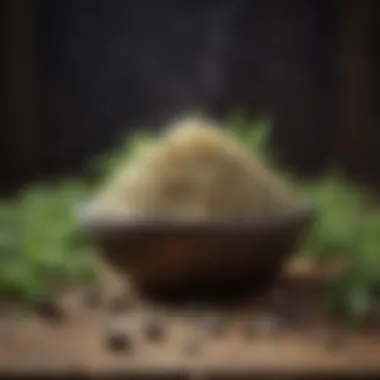Natural Remedies for Dry Scalp Relief at Home


Intro
Dry scalp can be an uncomfortable and frustrating experience for many. It often leads to itching, flaking, and general irritation. Addressing this issue at home can not only save time but also money. Instead of relying solely on commercial products, exploring home remedies provides solutions that may be more effective and kinder to your scalp. In this guide, we will examine practical methods to treat dry scalp effectively and sustainably. By understanding the causes, treatments, and preventive measures, you'll be equipped to improve your scalp health significantly.
Causes of Dry Scalp
Understanding the root causes of dry scalp is crucial. Several factors contribute to this condition:
- Environmental Factors: Cold weather and low humidity can strip moisture from the scalp.
- Poor Hair Care Habits: Overwashing hair or using harsh shampoos can lead to dryness.
- Diet and Hydration: Lack of essential nutrients and water can affect scalp health.
- Skin Conditions: Conditions like eczema or psoriasis can flare up, causing dryness.
Recognizing these causes can help in selecting the right treatment methods.
Natural Remedies for Dry Scalp
Coconut Oil
Coconut oil is well-known for its moisturizing properties. Applying it directly to the scalp will help in sealing moisture. Massage a few tablespoons into your scalp and leave it on for at least 30 minutes before washing.
Aloe Vera
Aloe vera gel is soothing and can reduce inflammation. Gently apply fresh aloe vera gel to your scalp, leave it on for 20 minutes, and rinse. This can relieve dryness and itching.
Apple Cider Vinegar
This ingredient helps balance the scalp's pH levels. Mix one part apple cider vinegar with two parts water, apply it to your scalp, and let it sit for 15 minutes before rinsing.
Honey
Known for its natural humectant properties, honey can attract moisture. Mix equal parts honey and warm water, apply to the scalp, and wash it off after 30 minutes.
Lifestyle Adjustments
Adopting certain lifestyle changes can significantly improve scalp health. Try to:
- Maintain hydration by drinking sufficient water throughout the day.
- Opt for gentle, sulfate-free shampoos that do not strip natural oils.
- Limit heat styling and use protective hairstyles to prevent scalp irritation.
- Incorporate a balanced diet with vitamins A, D, E, omega-3 fatty acids, and zinc for healthier skin.
Preventive Measures
Prevention is key to avoiding dry scalp in the future. Here are some tips:
- Use a Humidifier: This can add moisture to dry indoor air, particularly during winter months.
- Avoid Hot Showers: Hot water can remove natural oils from your scalp. Use lukewarm water instead.
- Choose the Right Hair Products: Pick hair care products with moisturizing ingredients.
By implementing these remedies and lifestyle changes, one can effectively manage and prevent dry scalp conditions.
The End
Maintaining a healthy scalp requires a combination of good habits and natural remedies. By following the methods outlined, you can create a routine that supports scalp health and provides relief from dryness. Invest time in your scalp care, and you will likely notice improvements in comfort and overall hair health.
Understanding Dry Scalp
Understanding dry scalp is crucial to addressing the issue effectively. This section elaborates on what dry scalp is, the symptoms that accompany it, and its underlying causes. Recognizing these elements empowers individuals to take appropriate measures. The condition can lead to discomfort and a range of secondary issues, making it vital to approach it comprehensively. Identifying triggers is the first step toward management.
What is Dry Scalp?
Dry scalp is a condition characterized by flakes and itchiness. The skin on the scalp loses moisture, leading to discomfort. This loss can occur for various reasons, including environmental conditions, skin disorders, and improper hair care. Understanding what constitutes dry scalp helps individuals recognize if they are experiencing it and seek remedies more efficiently.


Common Symptoms
The common symptoms of dry scalp encompass several noticeable signs.
- Flaking skin on the scalp
- Itching or irritation
- Redness or inflammation in severe cases
Identifying these symptoms can help differentiate dry scalp from other scalp conditions, such as psoriasis or dandruff, which may require different management strategies.
Causes of Dry Scalp
Understanding the causes of dry scalp is essential for targeted treatment. There are three main contributors: environmental factors, skin conditions, and improper hair care.
Environmental Factors
Environmental factors such as low humidity and harsh weather can substantially contribute to dry scalp. This characteristic makes it a significant concern for many people, especially during the winter months. When the air loses moisture, the scalp can also become dry. It's beneficial to be aware of how the environment affects scalp health, especially for people living in dry climates. One disadvantage is that while these factors can be managed to some extent, they often require ongoing awareness and adaptation.
Skin Conditions
Several skin conditions may lead to dry scalp. For example, eczema or psoriasis can disrupt the skin's natural moisture barrier. These conditions are critical to recognize as they may need specific treatments beyond general home remedies. The unique feature of skin conditions is that they often involve inflammation and more extensive skin care considerations. Understanding these conditions can help individuals choose the right approach to manage dry scalp effectively.
Improper Hair Care
Improper hair care practices can significantly worsen dry scalp. Using the wrong products or inadequate washing techniques can strip the scalp of its natural oils. Individuals should be aware of how their hair care routines affect scalp health. A key insight here is that the choice of shampoo or chemical treatments can have lasting effects on moisture levels. On the downside, many people may overlook this aspect, leading to prolonged discomfort.
"Awareness of the factors contributing to dry scalp can help individuals choose effective remedies and preventative measures."
Addressing each cause involves recognizing its impact and implementing appropriate solutions. By understanding dry scalp in its entirety, individuals can take informed steps toward restoring their scalp's health.
Home Remedies for Dry Scalp
Home remedies play a vital role in addressing dry scalp, offering accessible and cost-effective solutions. Many individuals prefer to use natural methods and ingredients as a first line of defense. These remedies can soothe irritation, hydrate the scalp, and restore balance. Lifestyle adjustments, along with these home treatments, pave the way for healthier scalp conditions.
Moisturizing Oils
Moisturizing oils serve as an excellent remedy for dry scalp. They nourish and help to retain moisture in the scalp, alleviating dryness effectively. Each type of oil brings unique properties that can benefit scalp health.
Coconut Oil
Coconut oil is renowned for its deep moisturizing properties. It is rich in fatty acids, which penetrate the hair follicle and scalp skin. The key characteristic of coconut oil is its ability to provide hydration while having antifungal properties that may combat dandruff. However, its effectiveness can depend on individual scalp conditions. Some people may find it to be too heavy, leading to grease buildup if overused.
Olive Oil
Olive oil is another popular choice. This oil is commonly known for its lighter texture, which allows for easy absorption. One of its key features is the presence of antioxidants that can protect the scalp from damage. Olive oil assists in improving the overall health of the scalp while also providing shine to the hair. However, for some individuals, it may not provide enough moisture for very dry scalps, making it essential to assess its suitability.
Argan Oil
Argan oil is often celebrated for its multi-faceted benefits. It contains high levels of vitamin E and essential fatty acids, promoting hydration. The most notable aspect of argan oil is its non-greasy feel, which makes it a favorite among many users. Its unique feature lies in its ability to nourish both scalp and hair without excessive buildup. On the downside, the cost of argan oil can be higher, which may deter some from using it regularly.
Aloe Vera Treatment
Aloe vera is cherished for its soothing and hydrating properties. The gel extracted from the leaves is cool and refreshing. It helps to calm irritation and supports moisture retention in the scalp. Its anti-inflammatory nature makes it suitable for those experiencing redness or discomfort. To use, simply apply the gel directly to the scalp, leave it on for about 30 minutes, and then wash it out. Regular application can lead to visible improvements.
Honey and Yogurt Mask
Combining honey and yogurt creates a nourishing mask for dry scalps. Honey is a natural humectant, which means it helps to draw moisture into the scalp. Yogurt, rich in probiotics, contributes to balancing scalp bacteria. To create this mask, mix equal parts of honey and yogurt, apply it to the scalp, and let it sit for 20 to 30 minutes. Rinse thoroughly for a hydrating effect that can improve dryness and add shine to the hair.
Apple Cider Vinegar Rinse


Apple cider vinegar acts as a natural exfoliant. It can help to remove buildup from products while balancing the scalp's pH level. This rinse can also enhance shine and reduce frizz. To prepare, dilute apple cider vinegar with water in a 1:1 ratio. After shampooing, pour the mixture over the scalp, let it sit for a couple of minutes, and then rinse thoroughly. Regular use can lead to a healthier scalp environment and reduce dryness.
Lifestyle Changes to Combat Dry Scalp
Addressing dry scalp requires more than just topical solutions; lifestyle changes are equally important. By shifting certain habits and routines, one can significantly improve scalp health. These changes are often practical and easy to incorporate into daily life, making them accessible for most individuals.
An important aspect involves improving hydration levels, adjusting diet, and managing stress. Each of these factors directly influences scalp condition. Let's dive deeper into these essential elements.
Hydration
Maintaining proper hydration is vital for skin health, including the scalp. Dehydration can lead to dryness, flakiness, and irritation. Drinking adequate water helps keep your skin, including the scalp, moisturized from within. It is recommended to drink at least 8 glasses of water daily, but individual needs may vary based on activity level and climate.
In addition to water, consuming hydrating foods is also beneficial. Foods high in water content, such as cucumbers and watermelon, contribute to overall fluid intake and skin health. Therefore, making a conscious effort to stay hydrated can fight dryness effectively.
Balanced Nutrition
A balanced diet nourishes your body and supports scalp health. Specific vitamins play crucial roles in maintaining scalp integrity. A deficiency in certain nutrients can exacerbate dry scalp issues.
Vitamins Essential for Scalp Health
Vitamins A, E, and D are particularly important for scalp health.
- Vitamin A: Supports the production of sebum, an oily substance that moisturizes the scalp. Adequate levels can help prevent dryness.
- Vitamin E: Known for its antioxidant properties, it improves circulation in the scalp and promotes healthy hair growth.
- Vitamin D: Contributes to hair follicle health and may aid in reducing scalp flakiness.
These vitamins are not only beneficial, but they should be incorporated into your diet for long-term results. Foods rich in these vitamins include leafy greens, nuts, and fatty fish.
Foods to Incorporate
Focusing on specific foods can enhance scalp condition.
- Fatty Fish: Salmon and mackerel, high in omega-3 fatty acids, support scalp health by providing hydration.
- Nuts and Seeds: Almonds and flaxseeds are packed with nutrients that support skin and hair health.
- Avocado: Rich in healthy fats and vitamins, avocados nourish the scalp and keep it moisturized.
Incorporating these foods into your meals provides necessary nutrients and contributes to overall wellness. This balanced approach can help mitigate dry scalp concerns over time.
Stress Management
Lastly, managing stress is essential for maintaining healthy skin and scalp. Chronic stress can lead to various skin issues, including dryness and irritation. Activities that reduce stress, such as yoga, meditation, or simply taking time for oneself, can be effective. Prioritizing self-care and finding healthy outlets for stress is crucial for scalp health.
Keeping stress levels in check not only benefits your mental health but also helps in maintaining a healthy scalp environment.
In summary, implementing lifestyle changes such as proper hydration, balanced nutrition, and effective stress management are essential steps in combating dry scalp. Each of these factors works synergistically to improve scalp conditions and overall health.
Hair Care Regimen for Dry Scalp
Maintaining a consistent hair care regimen is critical for managing dry scalp. A structured approach focuses on both the products used and the techniques employed during hair care. This is important for not only improving scalp health but also enhancing overall hair condition. Selecting the right products and strategies can significantly prevent dryness while minimizing irritation and discomfort.
Choosing the Right Shampoo
Choosing the right shampoo plays a vital role in treating dry scalp. Not all shampoos are created equal, and certain formulations are more suited for scalp hydration. Therefore, identifying what works best for you is essential.
Hydrating Ingredients to Look For
When selecting a shampoo, pay close attention to hydrating ingredients. Look for options that contain aloe vera, glycerin, and coconut oil. These ingredients are known for their excellent moisturizing properties.
- Aloe Vera: This ingredient is well-regarded for its soothing effect on the scalp. It hydrates and calms irritation, promoting a better scalp environment.
- Glycerin: A powerful humectant, glycerin draws moisture from the air into your hair and scalp, keeping them adequately hydrated.
- Coconut Oil: Despite being an oil, it provides moisture and improves scalp circulation.
These ingredients offer unique advantages, making them popular choices for those with dry scalp conditions. Choosing shampoos that include these components can lead to notable improvements in scalp hydration and comfort.


Shampoos to Avoid
Conversely, some shampoos should be avoided to prevent exacerbation of dry scalp. It is crucial to stay away from products that contain sulfates, parabens, and alcohol.
- Sulfates: These harsh detergents strip natural oils from your scalp and hair, leading to increased dryness.
- Parabens: While they are preservatives, they can cause irritation in certain individuals, worsening the dryness problem.
- Alcohol: Certain types of alcohol can be very drying and contribute to imbalances on the scalp.
Avoiding these ingredients can make a significant difference in your hair care routine, allowing for improved scalp health and overall comfort.
Conditioning Techniques
Conditioning is crucial for maintaining moisture on the scalp. Use conditioners that include similar hydrating ingredients found in shampoos to create a cohesive regimen. Focus on applying conditioner primarily to the scalp and roots to enhance hydration where it is most needed. Leave the conditioner in for a few minutes before rinsing to allow for deeper penetration. Consider using a leave-in conditioner for added moisture during the day.
Limit Heat Styling
Heat styling tools like blow dryers, straighteners, and curling wands can contribute to dryness. Limiting the use of these tools is important for maintaining a healthy scalp. If heat styling is necessary, make sure to use a heat protectant product to shield your hair and scalp from thermal damage. Opt for lower heat settings and always allow hair to air dry whenever possible.
When to Consult a Professional
Understanding when to consult a professional regarding dry scalp is essential. While many home remedies can alleviate symptoms, there are instances where professional guidance is necessary. A dermatologist can evaluate underlying conditions that may contribute to dryness, providing appropriate treatment options. Knowing the signs that warrant a visit can save time and enhance the effectiveness of the care you receive. This section will discuss indicators that it's time to seek professional help and what to expect when doing so.
Signs It's Time to See a Dermatologist
Recognizing specific signs can prompt the decision to consult a dermatologist. Some important indicators include:
- Persistent Symptoms: If dry scalp continues despite using home remedies or self-care strategies, it might signal an underlying issue.
- Severe Itching or Flaking: Intense itching or large flakes can indicate conditions such as eczema, psoriasis, or seborrheic dermatitis, which require medical diagnosis and treatment.
- Redness or Inflammation: Noticeable redness or inflammation on the scalp requires professional evaluation to avoid further complications.
- Hair Loss: If you experience unexplained hair loss along with dry scalp, it's crucial to seek a dermatologist's opinion, as this may relate to more serious health concerns.
- Infection Signs: Symptoms of infection, such as pus or increased tenderness, definitely need medical attention.
Recognizing these signs can help guide your decision towards consulting a professional for effective treatment.
What to Expect During Consultation
Understanding the consultation process eases the anxiety many feel before seeing a specialist. Here’s what typically occurs during a visit:
- Initial Assessment: The dermatologist will ask about your symptoms, health history, and any remedies you've tried. This helps them gather insight into your condition.
- Physical Examination: A thorough examination of your scalp is performed. The dermatologist may look for redness, scaling, or any signs of infection.
- Possible Tests: Sometimes, a skin scraping or biopsy may be recommended for further diagnosis, especially if a specific scalp condition is suspected.
- Treatment Options Discussion: Based on the findings, the dermatologist will discuss potential treatment plans, which may include medicated shampoos, topical treatments, or lifestyle suggestions.
- Follow-Up Recommendations: After the initial consultation, your dermatologist may schedule follow-up visits to monitor progress or adjust treatment as necessary.
Incorporating professional advice into self-care strategies can enhance your approach to treating a dry scalp.
Preventive Measures for Healthy Scalp
Maintaining a healthy scalp is essential in preventing dry scalp issues. By proactively addressing potential problems, one can avoid discomfort and ensure optimal scalp health. Preventive measures focus on establishing habits that promote moisture retention and overall scalp wellness.
Establishing a Routine
Establishing a daily hair care routine is vital for scalp health. Regular shampooing and conditioning are necessary to maintain cleanliness and hydration.
- Frequency: Avoid excessive washing as it can strip the scalp of its natural oils. Most people benefit from washing their hair 2-3 times a week.
- Selection of Products: Use sulfate-free shampoos to prevent irritation and dryness. Look for gentle formulas designed for scalp health to support moisture retention.
- Conditioning: Always follow up with a conditioner, paying attention to applying it on the scalp as well as the hair. This can help restore moisture and prevent dryness.
A committed routine helps keep the scalp balanced, reducing the likelihood of issues such as dryness and irritation.
Avoiding Harsh Chemicals
Harsh chemicals can significantly contribute to dry scalp. These substances often found in hair products can disrupt the natural balance of oils.
- Ingredients to Avoid: Look out for alcohol, parabens, and synthetic fragrances in your hair care products. These chemicals can lead to increased dryness and irritation.
- Reading Labels: Always read the labels of skincare and haircare products. Knowing what you are applying to your scalp can help prevent adverse effects.
- Opt for Natural Products: Consider using hair care products that are labeled as organic or natural. Ingredients like aloe vera and jojoba oil are beneficial for maintaining moisture.
Switching to gentler products is a proactive step in preserving scalp health and preventing dryness.
Regular Scalp Care Practice
Regular scalp care practices are crucial for maintaining a healthy scalp. Small adjustments can lead to significant benefits.
- Massage: Scalp massages can improve circulation and promote oil production, keeping the scalp nourished. Use your fingertips to massage the scalp gently while shampooing or applying oils.
- Exfoliation: Exfoliating the scalp can remove dead skin and product buildup. Use a gentle scalp scrub once a month to refresh the scalp.
- Hydrating Treatments: Incorporate hydrating treatments into your routine. Oils such as argan oil or coconut oil can be applied directly to the scalp to provide moisture.
Continuously practicing effective scalp care helps maintain hydration levels and prevents the onset of dry scalp issues.



